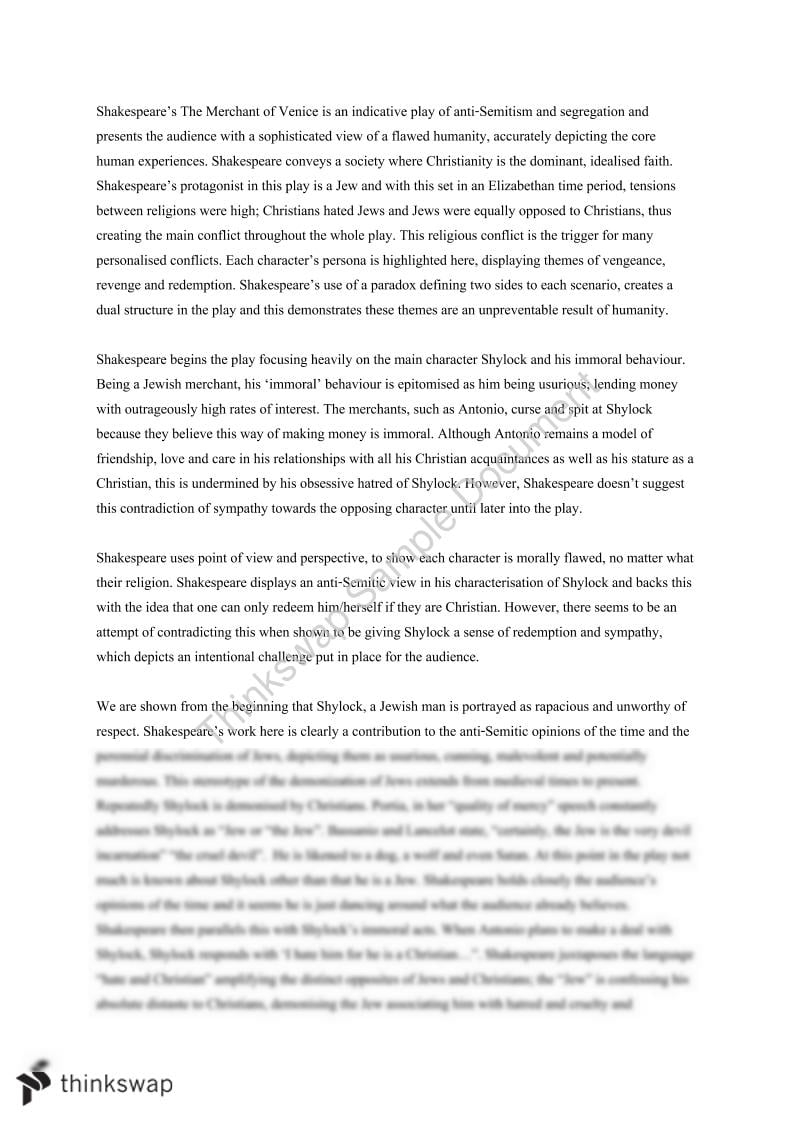The Merchant of Venice Essay Words4 Pages In the comedy, The Merchant of Venice, the roles and responsibilities of women is a significant social issue proposed by Shakespeare. This theme is communicated by the only three female characters in The Merchant of Venice is a tragedy Jean Racine, a French dramatist of the 17th century France, states, “Life is a comedy to those who think, a tragedy to those who feel” (Goodreads). In the early days of its staging, the play The Merchant of Venice written by William Shakespeare is considered to be a comedy, but as the world develops there is controversy as whether to believe that the The Merchant of Venice Examine the courtroom scene in The Merchant of Venice. How does it illuminate the play’s major themes? Shakespeare’s courtroom scene dramatizes a conflict between justice and mercy—the competing claims of an angry Shylock and a
Merchant of Venice Essay - Success Essays
Examine the courtroom scene in The Merchant of Venice. How does it illuminate the play's major themes? This argument mirrors several smaller disputes and personal crises throughout The Merchant of Venice. By placing the conflict at the center of his play, Shakespeare suggests that the pains of sacrifice are inescapable.
It is human to resent, and it is human to forgive, merchant of venice essay. The courtroom scene enacts a crisis all humans must someday face: whether to pardon an enemy or insist on revenge. Portia speaks on behalf of mercy, arguing that we must always forgive one another because we are constantly hoping for our own share of forgiveness from an all-knowing God, merchant of venice essay.
On the other hand, Shylock represents the all-too-human desire for justice. Invoking the supremacy of justice, she says he may have a pound of flesh but not a drop of blood, with the threatened penalty of death if he does not follow her terms exactly.
Mercy and justice—forgiveness and vengeance—spar relentlessly in this climactic scene. Shakespeare has laid the thematic groundwork for his climax by repeatedly noting the virtues of a merciful way of life.
Portia merchant of venice essay Bassanio for leaving Belmont on the night of their engagement, putting aside her own wishes and encouraging him to help his friend. Jessica and Lorenzo merchant of venice essay note the necessity of good humor; it is in the nature of lovers to stray and to make false promises, so we must merchant of venice essay to laugh and see what is best in one another. Each of these characters acts as an occasional spokesperson for the mild-mannered, magnanimous approach to life, merchant of venice essay.
Despite his constant sacrifices, Antonio becomes irritating when he seems to brood on his sense of perpetual martyrdom, and Gratiano urges him to abandon his silent grievances and enjoy his life. Long before the courtroom scene, Shylock embodies the human desire for revenge, asking why he should cooperate with Antonio when Antonio has ignored him and called him a cur.
The Prince of Arragon seems absurd when he claims Portia on the grounds that he deserves her, and the message in the silver casket rebukes him for thinking that we are ever naturally entitled to happiness.
By pitting mercy against justice in his climactic scene, Shakespeare suggests that everyone struggles with competing urges to complain and forgive. Merchant of venice essay demands the flesh the law has promised him, merchant of venice essay, and Portia argues that the world is merchant of venice essay complex to be governed by rigid laws.
Portia, Antonio, and Lorenzo all occasionally look past their own problems and behave generously, whereas other characters cannot overcome a gnawing sense of grievance and injustice. In five tolerant, effortless acts, Shakespeare shows us that we are destined to have these arguments—with others and with ourselves—every day of our lives. Ace your assignments with our guide to The Merchant of Venice!
Looking for homework help that takes the stress out of studying? Sign up for our weekly newsletter! Search all of SparkNotes Search Suggestions Use up and down arrows to review and enter to select. Plot Overview Key Questions and Answers What Does the Ending Mean? Character List Shylock Portia Antonio Jessica Bassanio. Themes Motifs Symbols Plot Analysis Protagonist Antagonist Setting Genre Style Point of View Tone Foreshadowing Key Facts Is Shylock a Villain?
Important Quotes Explained Quotes by Theme Friendship Wealth Prejudice Revenge Love Quotes by Section Act I, scenes i-ii Act I, scene iii Act II, scenes i-iv Act II, scenes v-ix Act III, scenes i-ii Act III, scenes iii-v Act IV, scene i Act V, scene i Quotes by Character Portia Shylock Antonio Bassanio Jessica.
Previous section Suggested Essay Topics. The Merchant of Venice SparkNotes Literature Guide EBOOK EDITION Ace your assignments with our guide to The Merchant of Venice! Popular pages: The Merchant of Venice. Take a Study Break.
Lit essay Merchant of Venice
, time: 22:17Merchant of Venice Essays | GradeSaver

Merchant of Venice literature essays are academic essays for citation. These papers were written primarily by students and provide critical analysis of Merchant of Venice. Study GuidesEstimated Reading Time: 5 mins The Merchant of Venice Essay Words4 Pages In the comedy, The Merchant of Venice, the roles and responsibilities of women is a significant social issue proposed by Shakespeare. This theme is communicated by the only three female characters in The Merchant of Venice Examine the courtroom scene in The Merchant of Venice. How does it illuminate the play’s major themes? Shakespeare’s courtroom scene dramatizes a conflict between justice and mercy—the competing claims of an angry Shylock and a
No comments:
Post a Comment